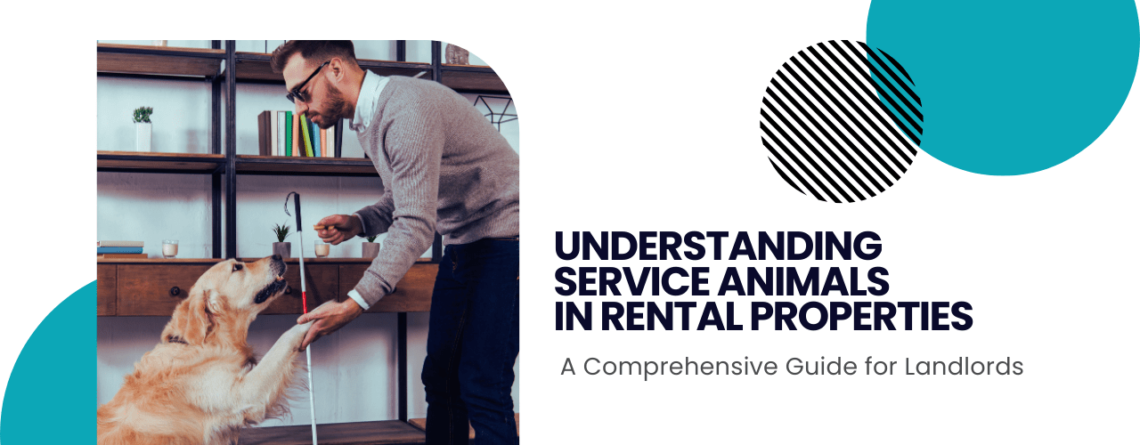Understanding Service Animals in Rental Properties: A Comprehensive Guide for Landlords
Accommodating tenants with service animals is a legal requirement when you’re renting out properties, and you might be surprised at how easily a mistake can be made. For landlords and rental property owners, understanding the legal obligations and best practices for managing properties with service animals is essential. We have put together a comprehensive guide that provides an overview to help you manage your rental properties effectively and lawfully.
According to the U.S. Census Bureau, more than 42 million people living in the United States have some kind of disability. There’s a good chance that you will, eventually, have a tenant who needs accommodations such as a service animal.
In addition to service animals, we’re talking about companion animals, too. These are different, but also protected by fair housing laws and the Americans with Disabilities Act (ADA).
Let’s Get Into Legal Definitions
There are specific characteristics and identifiers that are attached to service animals, and those have been established by the U.S. Department of Justice, within federal laws such as the Fair Housing Act and the Americans with Disabilities Act. Some states and local governments, however, have drafted their own laws and regulations that pertain to service animals.
Florida follows the federal guidelines. In Orlando and throughout central Florida, service animal law covers rental homes as well as public transportation, hotels, timeshares, places of amusement, resorts, and any other place to which the public is invited. People are permitted to bring their service animals into any of these places.
Under the ADA, the definition of public accommodations is very broad.
There are emotional support animals and companion animals, too, which also have protections but not as many protections as service animals.
It can be difficult to keep all of these accommodations straight and to understand what your rights and responsibilities are as a landlord. Here’s how to separate those two classes of accommodations as they pertain to your property:
- Understanding Service Animals
According to the Civil Rights Division of the U.S. Department of Justice, service animals are defined as dogs that are individually trained to do work or perform tasks for people with disabilities.
Only dogs can be service animals. Miniature horses can also be considered service animals, but only under very specific circumstances which would not normally apply to a tenant in a rental home. For your purposes as a landlord, service animals are always dogs.
Service animals have been individually trained to do specific work, or perform tasks for people with physical, mental, or emotional disabilities. The work or task an animal has been trained to provide must be directly related to the person’s disability.
Seeing Eye Dogs will guide people who are blind, for example. There are service animals that will alert people who are deaf to potential dangers. Some animals are trained to pull a wheelchair or protect someone who is having a seizure. People with a mental illness may rely on their service animal to take prescribed medications at specific times. They might serve as a coping mechanism to someone with Post Traumatic Stress Disorder who is having a panic attack.
The duties performed by a service animal will depend on the person and the disability.
Dogs and other animals whose sole function is to provide comfort or emotional support do not qualify as service animals under federal law. This definition does not affect or limit the broader definition of “assistance animal” under the Fair Housing Act. Assistance animals can serve different roles and may be an emotional support animal, companion animal, or therapy animal.
- Understanding Companion and Emotional Support Animals
Companion animals and support animals are not as easy to identify as service dogs, which usually wear something indicating their work. Companion animals also don’t have to be dogs. They can be birds or gerbils; a goat or a snake. Really, emotional support and companion animals can be any kind of animal.
An emotional support animal is not a service animal, but it’s also not a pet. An emotional support animal is a companion animal that provides therapeutic benefits to an individual with an intellectual, emotional, or psychiatric disability.
According to the law, a tenant seeking the emotional support animal must have a verifiable disability. This type of animal is considered a “reasonable accommodation” under the Fair Housing Amendments Act of 1988.
The United States Department of Housing and Urban Development (HUD) uses the term “assistance animal” to cover any animal that works, provides assistance, or performs tasks for the benefit of a person with a disability, or provides emotional support that alleviates one or more identified symptoms or effects of a person’s disability.
An emotional support animal is one type of assistance animal allowed as a reasonable accommodation, even if you’re renting out a property that does not allow pets. You cannot charge a pet fee or pet rent for that animal.
Complying with Fair Housing Laws and the ADA
Service and support animals are discussed in a number of federal, state, and local laws, but everything really starts with the Fair Housing Act (FHA), especially when we’re talking about your Orlando rental property.
According to the FHA, discrimination in rental properties and other housing practices is not permitted on the basis of several protected classes, including disability. The law states that service dogs do not have to meet any certain criteria, nor do they require certification, or any kind of special equipment, identification or tags. They often have this, but they aren’t required to.
There is no limit to the number of service animals a person with a disability may have, according to the FHA. Limitations, however, can be imposed when tenants request multiple service animals. You simply cannot impede a tenant’s ability to have full use and enjoyment of the property.
Each service animal request must be considered on a case-by-case basis, the same way you would consider any other requests for reasonable accommodation.
Your legal obligations include:
- Providing Reasonable Accommodation
Landlords must make reasonable accommodations for tenants with service animals. This means allowing the service animal to live with the tenant even if the property has a no-pets policy. Think of the service animal the same way you’d think about a wheelchair or a walker; your tenant has to have that accommodation in order to live safely in your property.
- No Additional Fees
Landlords cannot charge pet fees or deposits for service animals. However, tenants are responsible for any damage caused by the service animal. You will want to document any damage that you find after a tenant moves out so you can legally withhold that money from the security deposit.
- Documentation:
Landlords may request documentation that establishes the need for the service animal but cannot ask for specifics about the tenant’s disability. With emotional support animals and other companion animals, you can do a little more digging.
Let’s talk about that a bit more.
What Can Florida Landlords Ask and Not Ask?
It’s uncomfortable, sometimes, to talk about a person’s disability or probe too much into questions around their physical and mental health. People are entitled to their privacy. As a landlord, you don’t want to cross any legal or ethical lines.
You also want to protect your property and you want to avoid being scammed by someone who is potentially trying to make a pet look like a service animal.
As long as you are respectful and speaking within the confines of the law, you should feel free to ask a few elemental questions.
Legally, landlords can ask tenants if their service and/or emotional support animal is necessary for them to use and enjoy the housing unit that they’ve applied for or that they’re currently living in. You are permitted to ask tenants to provide documentation from a professional in the medical field, stating that the tenant has a disability resulting in one or more functional limitations.
Here’s what you cannot ask.
- You cannot ask about the nature or extent of a tenant’s disability. As long as the disability is documented, you don’t need to know anything else.
- Don’t ask if they were born with the disability or how old they were when they lost their sight.
- Don’t ask questions about what it’s like to live with the disability
- Don’t offer opinions or judgments that the tenant does not need to hear.
You also are not permitted to require that a tenant release any medical records to you. A medical note for a tenant moving in an emotional support snake is reasonable. Asking someone with a Seeing Eye Dog to document their blindness is ridiculous and illegal.
 We know this is an area of the law that can feel tricky. It’s also being updated frequently, so make sure you’re staying on top of its changes and interpretations. If you need property management expertise, we’re here to provide it.
We know this is an area of the law that can feel tricky. It’s also being updated frequently, so make sure you’re staying on top of its changes and interpretations. If you need property management expertise, we’re here to provide it.
Contact us at Homevest Management, Inc. for all of your Orlando property management needs. We serve all of Central Florida, including Winter Garden, Doctor Phillips, Baldwin Park, Winter Springs, and Windermere.











